
Communications in Combinatorics and Optimization
Scope & Guideline
Transforming Challenges into Solutions through Mathematics
Introduction
Aims and Scopes
- Combinatorial Optimization:
Focus on the study of optimization problems where the objective is to find the best solution from a finite set of solutions, using combinatorial structures. - Graph Theory:
Investigation of properties and applications of graphs, including domination, coloring, and spectral graph theory, which are prevalent themes in the published works. - Algorithm Development:
Emphasis on the design and analysis of algorithms for solving complex combinatorial and optimization problems, including approximation algorithms and computational complexity. - Mathematical Modeling:
Utilization of mathematical models to represent and solve real-world problems, particularly in network design, resource allocation, and scheduling. - Interdisciplinary Applications:
Application of combinatorial and optimization techniques to fields such as computer science, operations research, biology, and social sciences.
Trending and Emerging
- Multi-Objective Optimization:
Increasing focus on problems involving multiple objectives, where trade-offs between conflicting goals are analyzed, is becoming a significant area of research. - Graph Spectral Theory:
A surge in publications related to spectral graph theory, particularly concerning graph energies and indices, highlights a growing interest in the relationship between graph properties and their spectra. - Algorithmic Complexity and Efficiency:
A notable trend towards exploring the complexities and efficiencies of algorithms, particularly in the context of dominations and graph operations, showcases the need for robust computational methods. - Applications in Network Theory:
Research focusing on the application of combinatorial and optimization techniques to network structures, including traffic models and resource allocation in networks, is on the rise. - Fuzzy and Interval-Valued Graphs:
Emerging interest in the study of fuzzy graphs and interval-valued graphs reflects a broader trend towards incorporating uncertainty and flexibility into combinatorial structures.
Declining or Waning
- Classical Graph Theory:
Topics centered on traditional aspects of graph theory, such as basic graph properties and simpler algorithms, have seen a decline as more complex and applied theories gain prominence. - Elementary Combinatorial Results:
Basic combinatorial results and theorems that do not involve advanced techniques or applications are becoming less frequent, reflecting a trend toward more sophisticated and applicable research. - Static Optimization Problems:
Research focused on static or single-objective optimization problems is less common, as the trend shifts towards dynamic, multi-objective, and real-time optimization approaches.
Similar Journals

COMBINATORICA
Where Groundbreaking Research Meets Mathematical RigorCOMBINATORICA, published by Springer Heidelberg, is a leading international journal dedicated to advancing the fields of Discrete Mathematics and Combinatorics. With an illustrious history dating back to 1981 and a remarkable commitment to excellence, this journal has earned its place in the highest echelons of academic publishing, currently ranked in the Q1 category for both Computational Mathematics and Discrete Mathematics and Combinatorics. Located in Germany and recognized for its high-quality research contributions, COMBINATORICA fosters innovative discussions and disseminates significant findings that shape contemporary mathematical theory. Although it does not offer Open Access options, its rigorous peer-review process ensures that each publication meets the highest scholarly standards, making it an essential resource for researchers, professionals, and students engaged in mathematical sciences. With an impactful H-Index reflecting its citation influence, COMBINATORICA continues to be a pivotal platform for groundbreaking research in combinatorics and its applications.

Annals of Combinatorics
Innovating Research in Combinatorial TheoryAnnals of Combinatorics, published by Springer Basel AG, serves as a premier platform for innovation and research in the field of discrete mathematics and combinatorics. With an ISSN of 0218-0006 and an E-ISSN of 0219-3094, the journal captures the ongoing developments and breakthroughs that characterize this dynamic discipline, which plays a crucial role in various applications such as computer science, optimization, and statistical mechanics. The journal has been recognized as part of the Q2 category in the 2023 rankings for discrete mathematics and combinatorics, reflecting its significant contribution to the academic community. Researchers and educators alike benefit from its insightful articles that not only cover theoretical advancements but also practical implications. With convergence years spanning from 2005 to 2024, the Annals of Combinatorics continues to be an essential resource for anyone looking to deepen their understanding and explore new frontiers in combinatorial research.
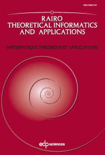
RAIRO-THEORETICAL INFORMATICS AND APPLICATIONS
Bridging Theory and Application in Informatics.RAIRO - Theoretical Informatics and Applications is a renowned academic journal published by EDP Sciences S A that has been at the forefront of disseminating innovative research and applications in the fields of computer science and mathematics since its inception in 1995. With a focus on theoretical and applied aspects of informatics, the journal serves as a vital resource for researchers and professionals seeking to explore the intricacies of computational theories and their practical applications. Although currently lacking an Open Access model, it provides invaluable insights from distinguished researchers within its Q4 category rankings across its pertinent fields. As reflected in its Scopus rankings, including a position in the 24th percentile for General Mathematics and the 9th percentile for Computer Science Applications, RAIRO is pivotal in contributing to the ongoing discourse and advancements in theoretical informatics. Researchers, professionals, and students will find this journal critical in understanding emerging trends and challenges in the rapidly evolving domains of computer science and mathematics.

ALGORITHMICA
Transforming Theoretical Concepts into Practical ApplicationsALGORITHMICA is a premier academic journal published by SPRINGER, dedicated to the field of algorithms and their applications across various domains. With an ISSN of 0178-4617 and an E-ISSN of 1432-0541, this journal serves as a vital resource for researchers and practitioners interested in the theoretical and practical aspects of algorithmic design and analysis. Recognized for its high impact, ALGORITHMICA is listed in the top quartile (Q1) for Applied Mathematics and Computer Science (miscellaneous) and is positioned in Q2 for Computer Science Applications in the 2023 category rankings. The journal has continuously contributed to advancing knowledge from its inception in 1986 to its ongoing publications through 2024. With a commitment to rigorous peer review and high-quality research, ALGORITHMICA is essential for anyone serious about pushing the boundaries of algorithmic study and application.
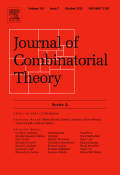
JOURNAL OF COMBINATORIAL THEORY SERIES A
Championing Excellence in Combinatorial Research.JOURNAL OF COMBINATORIAL THEORY SERIES A, published by Academic Press Inc. Elsevier Science, stands as a pivotal platform for researchers in the realm of combinatorial mathematics and theoretical computer science. With an impact factor that underscores its influence and a well-respected reputation reflected in its rapid ascent to Q1 rankings in discrete mathematics and computational theory, this journal serves as a critical resource for academics seeking to advance their understanding of complex combinatorial structures and algorithms.
Founded in 1971, the journal covers a wide spectrum of topics within combinatorial theory, providing a robust forum for innovative research and theoretical advancements until 2025. Including a strong position in the Scopus rankings—notably, it ranks #10 out of 92 in discrete mathematics—the journal is essential for both emerging scholars and established professionals committed to pushing the boundaries of mathematical and computational inquiry. Researchers are encouraged to submit their findings to this esteemed publication, as it offers a non-open-access model that ensures rigorous peer review and high visibility within the academic community.
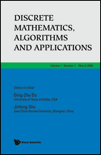
Discrete Mathematics Algorithms and Applications
Elevating Discrete Mathematics Through Rigorous Research.Discrete Mathematics Algorithms and Applications, published by World Scientific Publishing Co Pte Ltd, stands as a pivotal resource in the field of discrete mathematics and combinatorics since its inception in 2009, with a convergence period extending to 2024. The journal holds an esteemed position within its category, ranked in the Q3 quartile according to latest metrics, recognized for its qualitative contributions to the academic community. With an ISSN of 1793-8309 and an E-ISSN of 1793-8317, it serves as a vital conduit for disseminating innovative research focused on algorithms and their applications within discrete mathematics. Although currently not an open access journal, it provides access to valuable insights and findings that are crucial for researchers, professionals, and students seeking to advance their understanding and application of discrete mathematical concepts. Based in Singapore, the journal continues to promote rigorous scholarly discourse and is a key publication for those involved in advancing the discipline.
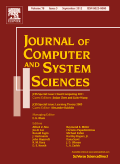
JOURNAL OF COMPUTER AND SYSTEM SCIENCES
Exploring innovative theories in computer and applied mathematics.The Journal of Computer and System Sciences is a distinguished publication founded in 1967 and continually striving to push the boundaries of knowledge in computer science and applied mathematics. Published by Academic Press Inc, Elsevier Science, this journal boasts impressive credentials, holding a Q1 quartile ranking across multiple categories including Applied Mathematics, Computational Theory and Mathematics, Computer Networks and Communications, and Theoretical Computer Science as of 2023. With a focus on innovative research and comprehensive theoretical developments, this journal serves as a pivotal forum for authors and readers alike, facilitating cutting-edge contributions to the field. The journal is not currently open access, providing a curated selection of high-quality articles for its subscription residents. By engaging with this journal, researchers, professionals, and students can gain insight into the latest trends, prominent methodologies, and significant findings that shape the modern landscape of computing and systems analysis.
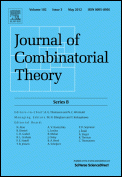
JOURNAL OF COMBINATORIAL THEORY SERIES B
Driving the Evolution of Computational TheoryJOURNAL OF COMBINATORIAL THEORY SERIES B, published by Academic Press Inc., Elsevier Science, is an esteemed journal within the discipline of combinatorial theory, discrete mathematics, and theoretical computer science. With a rich history since its inception in 1971 and ongoing publication through 2025, this journal has established itself as a pillar in its field, currently holding Q1 category rankings in multiple areas including Computational Theory and Mathematics, Discrete Mathematics and Combinatorics, and Theoretical Computer Science. The journal features cutting-edge research and developments, attracting contributions from both established professionals and emerging scholars. Despite the absence of an open access option, the journal's strong impact reflected in its Scopus ranks—such as being number 16 out of 92 in Discrete Mathematics and Combinatorics (83rd percentile)—signifies its influential role in advancing knowledge and innovation. Researchers seeking to share impactful findings and connect with a vibrant academic community will find the JOURNAL OF COMBINATORIAL THEORY SERIES B an essential resource.

Algorithms
Elevating Standards in Algorithmic Research and Discussion.Algorithms is a prestigious and innovative journal published by MDPI, focusing on the rapidly evolving fields of computational mathematics, numerical analysis, and theoretical computer science. Launched in 2008, this open access journal seeks to foster collaboration and knowledge sharing among researchers, professionals, and students by providing a platform for the dissemination of high-quality research articles, reviews, and notes. With its operational base in Basel, Switzerland, Algorithms has steadily established itself in the academic community, achieving commendable rankings such as Q2 in Computational Mathematics and Numerical Analysis, as well as Q3 in Computational Theory and Mathematics and Theoretical Computer Science as of 2023. Furthermore, the journal boasts impressive Scopus rankings, placing it within the top 20% in several categories, underscoring its relevance and influence in the field. As an open access journal, Algorithms ensures that its content is accessible to all, promoting the advancement of algorithmic research and fostering critical discussions that may shape the future of the discipline.

Transactions on Combinatorics
Advancing Combinatorial Insights for a Global CommunityTransactions on Combinatorics is an esteemed academic journal dedicated to advancing the field of combinatorial mathematics. Published by UNIV ISFAHAN, VICE PRESIDENT RESEARCH & TECHNOLOGY, this journal has been an Open Access platform since 2012, ensuring that innovative research is freely available to scholars across the globe. With an ISSN of 2251-8657 and an E-ISSN of 2251-8665, it fosters a community for researchers to disseminate their findings within the realms of Computational Theory and Discrete Mathematics. The journal has been classified in the Q4 category for both its major fields in 2023 and holds notable Scopus rankings that reflect its growing influence in the academic community, despite currently being in the lower quartiles. The journal covers a diverse range of topics from theoretical frameworks to practical applications, making it a valuable resource for researchers, professionals, and students who are passionate about combinatorics. Addressed from DEPT PRINTING & PUBLISHING MAGAZINES, HEZAR-JARIB AVE, ISAFAHAN 81746-73441, IRAN, it stands as a beacon for collaborative research and knowledge sharing in this essential field.